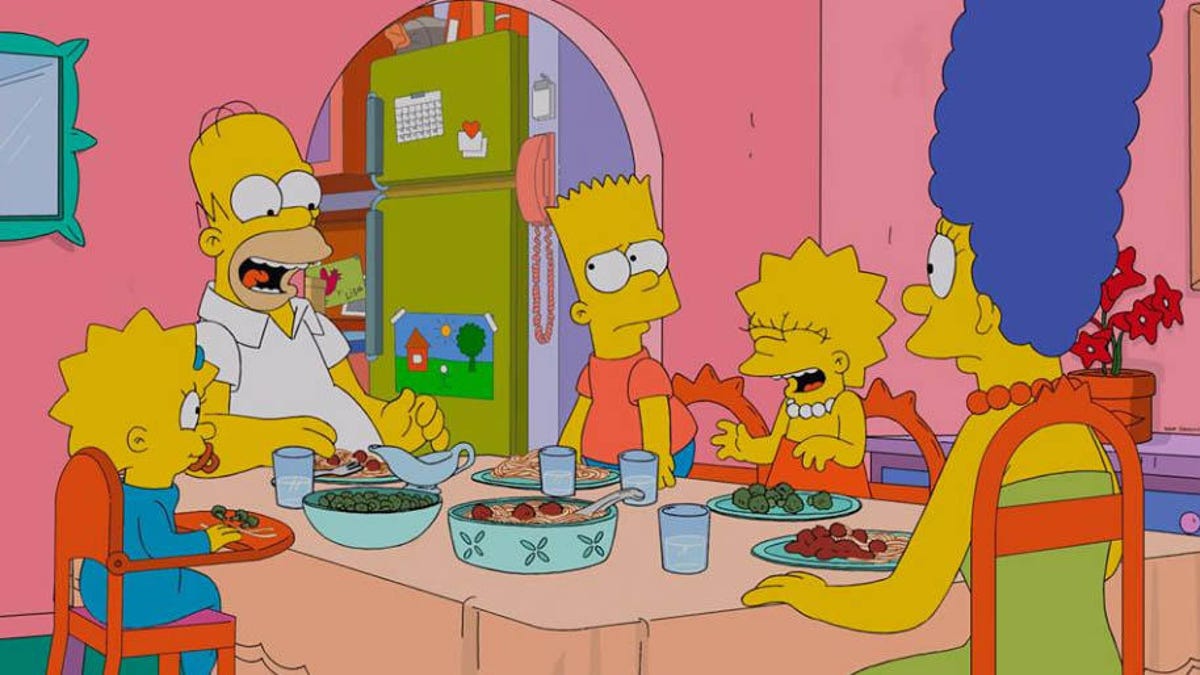The Simpsons at 30: One big mistake cost the show its laughs
Commentary: When it first aired 30 years ago, The Simpsons was groundbreaking TV. The gags just don't produce the same laughs anymore.

After 30 years of episodes, is The Simpsons still funny?
I was hooked on The Simpsons since the first episode, a touching Christmas offering called "Simpsons Roasting on an Open Fire." It showed the dysfunctional-yet-loving family finding the true spirit of Christmas, and it was funny, sad and very different than anything else on TV.
Plus, it was a TV comedy without a laugh track. The show trusted the audience to know when something was funny.
The Simpsons first premiered 30 years ago, on Dec. 17, 1989 on Fox Network, and it kept me laughing with its constant GenX references to video games , fast food mascots, horror movies, popular TV shows and my favorite bands. How many cartoons do you know that have The Ramones, Smashing Pumpkins and the Red Hot Chili Peppers as special guests?
But what made the '90s-era Simpsons episodes so entertaining wasn't just the pop culture references. The characters' personalities were easy to identify and individual episode plots were well-structured. The jokes were more than just punchlines. The gags could be dark, poignant and multilayered.
The Red Hot Chili Peppers perform on The Simpsons.
Most importantly, the pop culture references didn't drive the animated show, they just enhanced it. After all, the secret to successful referential humor is that it has to make sense in the episode itself, and not be merely a tip of the hat to pop culture.
That said, The Simpsons understood the ages, interests and pop culture knowledge of its viewers. If you were a GenX viewer watching The Simpsons in the '90s, it would be relatively easy to catch all the references, especially in the Who Shot Mr. Burns? two-parter. It references '80s TV drama Dallas, whose main character J.R. is shot in the season cliffhanger. The fictional shooting was a huge TV event, and GenXers would have remembered the popularity of the series.
But as The Simpsons kept getting renewed year after year, it stopped getting funnier. The dependence on pop culture references -- at the expense of character development and plot structure -- started to become more apparent after season 8 (especially since many of the original writers left the show).
Most episodes made after 1998-99 felt like the series cared more about quick nods to trending topics or focusing on its many celebrity guest stars than it did about developing its main characters.
Since the late '90s, The Simpsons has experienced backlash from fans, as well as lower viewership. In May, The Simpsons hit its all-time lowest ratings with adults aged 18-49.
Humor that's only relevant for a short time frame simply doesn't age well. The Simpsons writers may think they're being clever sneaking in nods to TV shows that haven't been talked about since the '90s, or name dropping washed-up celebrities from decades ago, but that doesn't mean the current audience of millennials and younger will take the time to google the punchlines.
Can a show that makes such arcane and outdated references still call itself a comedy if you have to explain why it's funny?
Case in point: In the newest season's opener "The Winter of Our Monetized Content" (season 31, episode 1), a YouTube livestream catches Homer and Bart fighting and the video goes viral. The idea of both Bart and Homer becoming famous by accident is nothing new to the show, but instead of focusing on their relationship or even why they fight, there are nonstop pop culture references thrown at the audience to keep the show relevant.
Lisa channels the real-life union icon Norma Rae in The Simpsons episode "The Winter of Our Monetized Content."
A pop-culture-reference machine
Ironically, even when this episode pokes fun at YouTubers, Vine, Venmo, hipsters and microbrews, there are just as many bizarre outdated gags about the '90s TV sitcom Murphy Brown, Y2K, union icon Norma Rae, The Breakfast Club movie and even the Vietnam War.
There's also Lisa reading literary journal Granta, which was popular with intellectual college kids in the '90s. You can't get any more obscure than that. And I guarantee viewers in their 20s watching The Simpsons' latest season won't have a clue what that means.
The Simpsons used to mix high-brow and low-brow satire in a way that made it feel timeless, but now it just feels like a pop-culture-reference machine that makes jokes about the oddest things. When was the last time you giggled over a joke about Centrum Silver vitamins or clothing company founder Eddie Bauer's signature?
As much as I loved The Simpsons as a 20-something in the '90s, I don't even watch it much as a 40-something in 2019.
I find myself saying aloud, "Was that supposed to be funny?" whenever there's a fat-shaming joke or an outdated reference to MySpace. I don't think I'm too old to appreciate The Simpsons, but there's a good chance The Simpsons is too old to understand me.
Originally published Dec. 16, 1:50 p.m.

